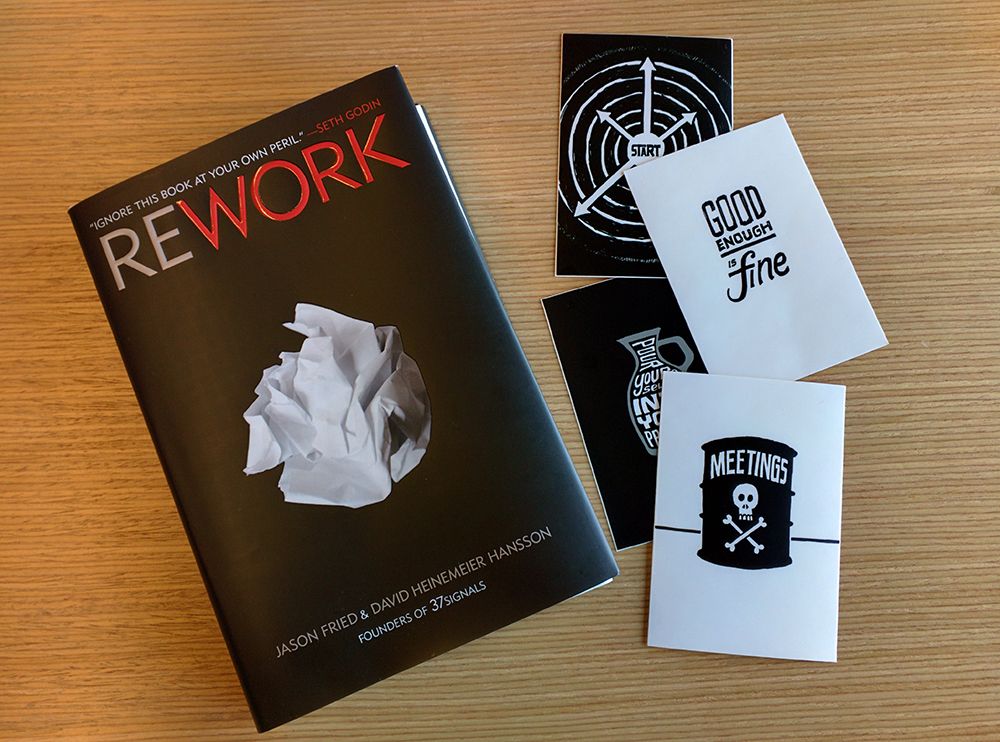ReWork

A book by Jason Fried and David Heinemeier Hansson
ReWork
A radical new business book from business trailblazers Jason Fried and David Heinemeier Hansson that offers a reappraisal of business best practice - advocating stripping everything back to bare essentials. With its straightforward language and easy-is-better approach, Rework is the perfect playbook…
Rework Shows You a Better, Faster, Easier Way to Succeed in Business.
Book Summary
The book offers unconventional advice for running a successful business and emphasizes the importance of simplicity and focus in the modern business world.
The book covers various topics, including hiring and managing employees, marketing, and building and growing a business. It is conversational and includes numerous examples and case studies from the authors' own experiences running Basecamp.
Practical Advices
- Don't wait for a perfect plan – just start.
- Don't follow the competition – create your own path.
- Don't worry about funding – be self-sufficient.
- Don't spend money on advertising – focus on creating a great product, and word of mouth will spread.
- Don't try to please everyone – focus on a specific target market.
- Don't overdo it – focus on the core elements of your business.
- Don't be a perfectionist – focus on getting things done and making progress.
- Don't waste time on meetings – keep them short and focused.
- Don't worry about office politics – focus on results.
- Don't try to control everything – give your employees the freedom and responsibility to make their own decisions.
- Don't be afraid to say no – focus on what matters most.
- Don't worry about failure – embrace it as a learning opportunity.
- Don't worry about making money immediately – focus on creating a sustainable business.
- Don't let bureaucracy get in the way – keep things simple and streamlined.
- Don't be afraid to pivot – be open to changing your business model if it's not working.
- Don't be afraid to ask for help – seek out mentors and advisors.
- Don't be afraid to delegate – focus on your strengths and let others handle the rest.
- Don't be afraid to say, "I don't know" – it's okay to admit when you don't have all the answers.
- Don't be afraid to take risks – sometimes, you must take a chance to succeed.
- Don't be afraid to make mistakes – they are an inevitable part of the learning process.
Quotes
"The difference between successful people and everyone else is that successful people do all the things that everyone else doesn't want to do."
"Working long hours doesn't mean you're working smart."
"The only way to do great work is to love what you do. If you haven't found it yet, keep looking. Don't settle. As with all matters of the heart, you'll know when you find it."
"A business is simply an idea to make other people's lives better."
"Ideas are just a multiplier of execution."
"Meetings are toxic to productivity."
"There's never enough time to do it right, but always enough time to do it over."
"Start before you're ready."
"Embrace constraints – they'll help you focus and be more creative."
"The more you try to control everything, the less control you have."
"Innovation comes from the producer, not the customer."
"When you're working on a startup, the first thing you need to do is get traction. Everything else is secondary."
"The only way to do great work is to love what you do."
"The best way to get a good idea is to get lots of ideas."
"You don't need a business plan. You need a product and a customer."
"Don't worry about being original. Just focus on being good."
"The most effective marketing strategy is word of mouth."
"Marketing is not a department – it's everyone's job."
"Marketing is about creating genuine connections with people."
"The goal of a business is to make money by solving customer problems."
My Notes
Chapter 1 [Teardown]
- Ignore the real world and the idea that some things won't work in the real world (4 days, remote work... Etc).
- Learn from your mistakes and successes.
- Plans are guesses; change the way you think of the plans as guesses.
- You will have the most information about something when you are doing it.
- Figure out the next important thing, not 3 years plan.
- Why be a big company? Why expand? Sanford didn't open in other locations.
- Avoid workaholics; you just work more. Be more efficient and productive rather than add more time to your work agenda.
- Workaholics are not heroes. Finish your work on time, and you are a hero.
Chapter 2 [Go]
- Starters rather than an entrepreneur.
- People should say this makes my life better. Do something that matters.
- Make something you want to use.
- Make something; before that, your idea is just an idea.
- When you want something bad enough, you will make time.
- Create a possible Mission statement. Standing for something is not about writing it down. It's about believing it and living it and
- Outside money as plan Z. Losing control when you give money.
- Business, not a startup. Profit is key to keeping going. Without a profit, that's a hobby.
- Don't think of your existing strategies before starting.
- At the start, you are the fastest, and later you will get slower.
Chapter 3 [Progress]
- Limited resources force us to be creative.
- Do one thing right, not 10 things together at the same time.
- Start at the center. Ask yourself to find your center... If you take this thing out, would your business continue?
- Ignore the details at the start.
- Decide and move forward.
- Remove things that don't matter anywhere (meeting, feature, documentation ...etc.).
- Do less (trim the menu).
- Focus on what won't change (People want things today and years from now), permanent features like simplicity or speed, convenience... Etc.
- You don't need the best gear to start or succeed.
- Make a buy product.
- Lunch your product now. Ask yourself what you would though if you wanted to lunch your product in 2 weeks.
Chapter 4 [Productivty]
- Find out what to do next with iterations.
- Draw things whenever you can. When reading text reports, everyone will understand things differently.
- Ask yourself, why are you doing what you are doing? Is it useful? Is it helping someone? Are you adding value?
- Value is about balance... Too much ketchup ruins 🍟
- Interpretation is the enemy of productivity.
- Get alone zone to do things.
- Meetings are harmful and toxic. Set a timer, agenda, few people, start with the problem, and leave with the solution.
- Good enough solutions are acceptable. You can always turn good to great later.
- Get momentum through small victories.
- Don't be a hero if things are not working out. Ask if it's worth it (When the task takes 15 hours, not 2 hours as planned).
- Sleep to keep creativity.
- Your estimate is bad. Reality is not the best-case scenario.
- Break the big thing into more minor things. More accurate estimation.
- Short to-do list, split big list to complete them step by step and keep progress.
- Make tiny decisions, so you don't make big mistakes.
Chapter 5[Competitors]
- Don't copy.
- Make yourself part of the product so no one can copy you ... Your culture and values are inside the product.
- Pick a fight.
- Doing less than your competitors can be an advantage.
- Say no by default, even for your ideas.
Chapter 6[Promotion]
- Do whatever you want; you are in the shadow.
- Build audience
- Readers of your blog.
- If they like what you have to say, they will mostly buy your product.
- Out-teach your competitor.
- Teach people to trust you more and be your fans.
- Share everything you know.
- Let people see what you do, the effort, and the process
- Don't be afraid to show your flaws. There is beauty in that.
- Press releases are spam.
- Standout and be unforgettable.
- Give free taste at first, and make your product addictive.
- Marketing is for everyone. Not for a specific department in your company.
- Slow, measured growth is much better than instant success with no base.
Chapter 7[Hiring]
- Do the job before you hire for it.
- Hire when it hurts. Only when you need it.
- CV is Spam (A cover letter is the most important)
- Hire the best writer. Writing is today's currency everywhere.
Chapter 8[Damage Control]
- Speed and time are the keys to excellent customer service.
- Be personal when saying sorry.
- Use appropriate tone and language.
- Everyone on the team should be connected with customers from time to time
- Negative reactions are the default for any new change. People will adjust later.
Chapter 9[Culture]
- Don't make a problem you don't have yet.
- You don't create culture; it happens.
- Culture is action, not written words.
- The environment has a big impact on your culture.
- Write to be read. Not just to write.
💡
4 letters words to avoid as much
- Need ==maybe
- Must
- Can't
- Easy
- Just
- Only
- Fast
Their more than 4-letters sisters
- Everyone
- Noone
- Always
- Never
- ASAP is poison
- Need ==maybe
- Must
- Can't
- Easy
- Just
- Only
- Fast
Their more than 4-letters sisters
- Everyone
- Noone
- Always
- Never
- ASAP is poison
